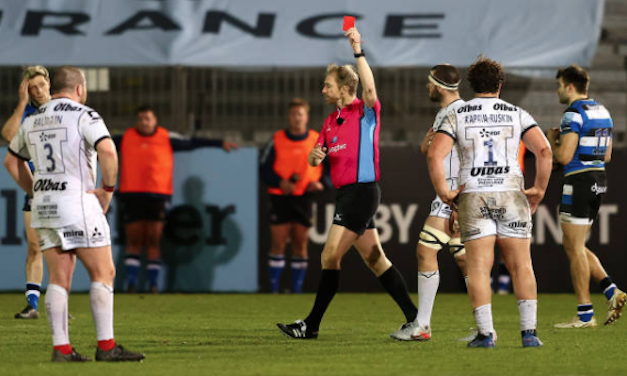This weekend’s Premiership was marked by a series of sanctions for foul play, including a red cards for Jasper Wiese and Hanro Liebenberg, and a yellow for Jean-Luc du Preez. Players need to adapt to the stricter interpretations of the law, writes ANDRE-PIERRE CRONJE.
READ: Coetzee suffers knee injury
More red cards were brandished in the most recent round of Premiership fixtures than in the entire season up until this point. Gloucester’s Val Rapava-Ruskin was given his marching orders for barrelling into a tackle leading with his forearm.
Not to be outdone, Bath’s Mike Williams promptly got himself sent off later in that same game for tackling with his shoulder straight to the head of Kyle Moyle.
A day later and it was the turn of Leicester’s Wiese to see red after hurtling into a breakdown and cleaning out a Wasps player, again with his shoulder making head contact.
The trend of the weekend continued with Wasps’ Kieran Brookes sent off for a dangerous, no-arms tackle to the head. As the match drew to a close, Liebenberg was also shown red for tackling a man in the air.
In between the litany of these red cards was also a yellow for Du Preez. The Sale flank went off his feet and failed to wrap his arms in making a dangerous cleanout on Alex Dombrandt.
While Dombrandt may have given quite the pantomime performance in order to try to exacerbate the scale of the offense, the fact remains that Du Preez should never have put himself in such a position.
What is perhaps most frustrating about all five sanctions is that they were unequivocally deserved. In each instance, the referee and TMO combined well and applied the existing legal framework correctly. While there will no doubt be partisan disagreement but, objectively speaking, the correct sanctions were meted out to the offending parties.
The question then remains: why are players still committing such obvious offences? Rugby as a sport needs some significant introspection. The long-term impacts of head injuries have been brought to the fore by the group-litigation claim led by former England international Steve Thompson.
Thompson’s claim (supported by dozens of ex-players) has put the impact of concussion firmly under the microscope. Within this tricky climate, referees have responded by applying the strictest interpretation to any act which involves contact to the head. A directive was no doubt issued from above.
This weekend in the Premiership may well be a watershed moment. It follows two weeks of high-profile red cards in the Six Nations and serves to reinforce the message that any contact to the head will result in serious punishment.
Rugby coaches and players have no choice but to adapt to the new interpretations. A red card can have an intensely debilitating effect on a side. Rarely do teams that have suffered one go on to win their matches. Discipline has never been more important.
For South African players, who unfortunately feature prominently in this week’s sanctions, it will be an ongoing challenge to temper their physicality and aggression. The qualities which make players like Du Preez, Wiese and Liebenberg so effective also present a serious potential liability.
Rassie Erasmus and Jacques Nienaber will be keeping a keen eye on the Premiership and Six Nations as it is likely that the refereeing interpretations in these tournaments will be applied to the Lions series.
In international rugby, the margins between victory and defeat are even tighter and there will be no scope for ill-discipline in the Springbok team.




